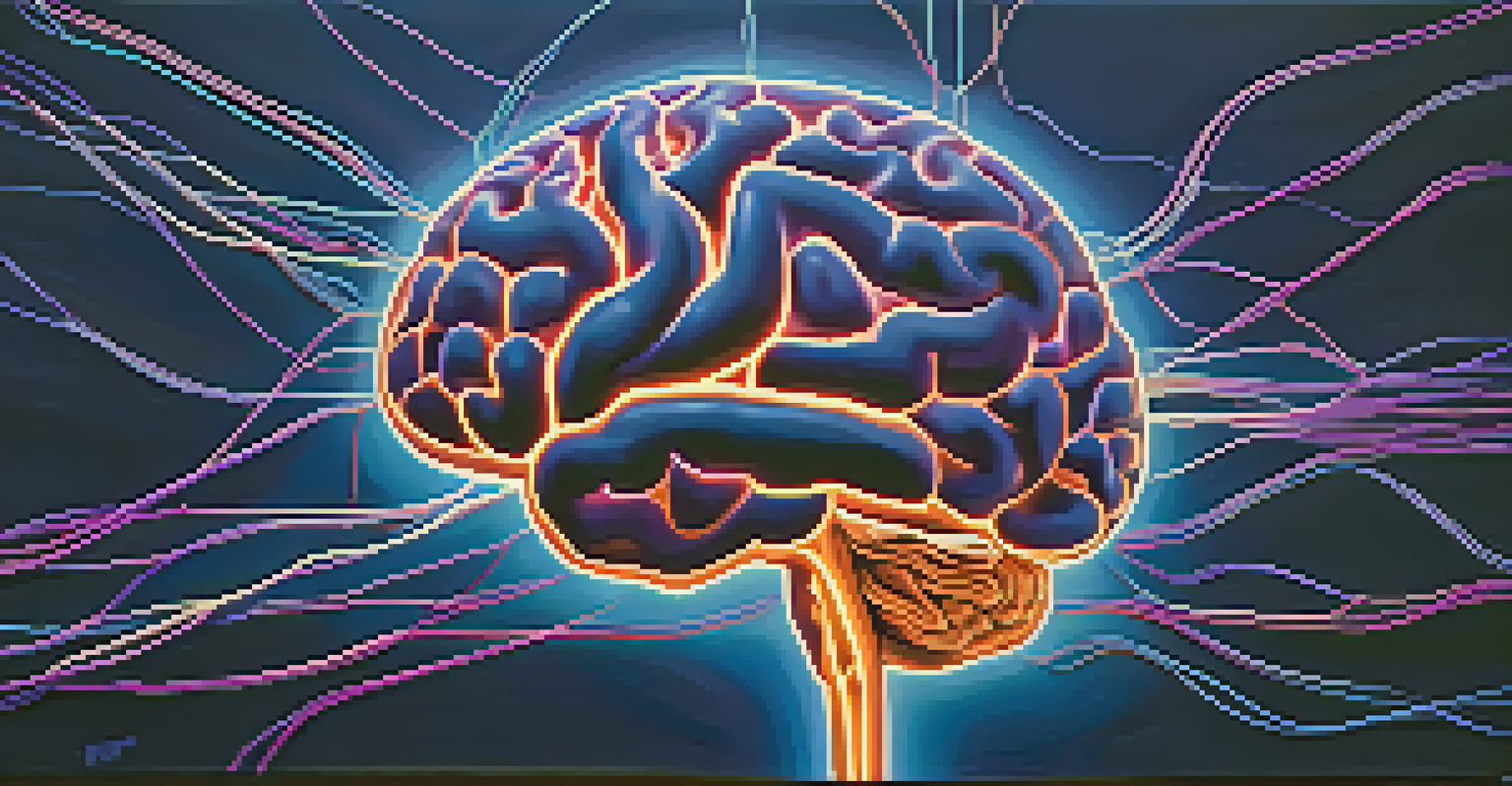Exploring Psychedelics: A New Era for Consciousness Research

The Growing Interest in Psychedelics for Research
In recent years, there has been a significant resurgence in the interest surrounding psychedelics. Once stigmatized and largely associated with counterculture, substances like psilocybin and LSD are now being examined for their potential therapeutic benefits. This renewed focus has sparked a wave of scientific studies, generating excitement among researchers and mental health professionals alike.
Psychedelics can help us confront our fears and traumas in a way that traditional therapy often cannot.
The shift is primarily driven by a growing body of evidence suggesting that psychedelics can aid in treating mental health disorders such as depression, PTSD, and anxiety. For example, studies have shown that psilocybin can lead to substantial reductions in depression symptoms in just a few sessions. Such findings challenge the traditional views on mental health treatments and open doors to innovative therapeutic approaches.
Moreover, the changing legal landscape surrounding psychedelics is paving the way for more extensive research. As some regions decriminalize or regulate these substances, researchers are gaining access to previously restricted materials. This is not just a trend; it's a movement towards a better understanding of human consciousness and mental wellness.
Psychedelics and Their Historical Context
To understand the current landscape of psychedelics, it's essential to consider their historical context. Indigenous cultures have utilized these substances for centuries, often for spiritual or healing purposes. For instance, the use of ayahuasca in Amazonian tribes highlights the deep-rooted connection between psychedelics and consciousness exploration.

In the mid-20th century, psychedelics gained popularity in Western society, particularly among artists and intellectuals. However, their association with the counterculture movement led to a backlash, resulting in strict regulations and a halt in research. This period of prohibition stifled our understanding of these substances and their potential benefits.
Psychedelics Show Promise for Healing
Research indicates that psychedelics like psilocybin can significantly alleviate symptoms of mental health disorders such as depression and PTSD.
Today, as we re-examine the role of psychedelics in society, we are rediscovering their potential not only for treatment but also for expanding consciousness. By looking back at their historical usage, we can appreciate the wisdom of traditional practices while integrating modern scientific approaches.
The Science Behind Psychedelics and Consciousness
Recent studies are revealing how psychedelics interact with the brain, particularly focusing on the default mode network (DMN). This network is often associated with self-referential thoughts and the sense of ego. When psychedelics are introduced, the DMN shows decreased activity, which can lead to experiences of ego dissolution and altered states of consciousness.
The experience of psychedelics can lead to profound insights, creativity, and a new understanding of the self.
These altered states can be profoundly transformative, providing individuals with new perspectives on their lives and experiences. For example, people often report feelings of interconnectedness, heightened creativity, and an enhanced sense of purpose. Such experiences can be therapeutic, allowing individuals to confront and process unresolved issues.
Additionally, the neuroplasticity induced by psychedelics may promote lasting changes in thought patterns and behavior. This potential for rewiring the brain opens exciting possibilities for addressing mental health challenges. The implications of this research are vast, suggesting that psychedelics might not only treat symptoms but also foster deep, lasting change.
Therapeutic Uses of Psychedelics: A Closer Look
One of the most promising areas of psychedelic research is its therapeutic applications, particularly in treating mental health disorders. Clinical trials have shown that psychedelics can significantly alleviate symptoms of depression and anxiety, often after just a few sessions. For instance, patients undergoing psilocybin therapy have reported substantial improvements in their mood and outlook on life.
Moreover, psychedelics are being explored for their potential in treating trauma and PTSD. The ability of these substances to facilitate profound emotional experiences can help individuals confront and process painful memories. This therapeutic approach contrasts with traditional methods, offering a more holistic path to healing.
Historical Roots of Psychedelic Use
Psychedelics have been utilized for centuries in various cultures for spiritual and healing purposes, offering valuable insights into their potential benefits.
As research continues to evolve, we are likely to see more innovative treatments emerge, utilizing psychedelics as adjuncts to psychotherapy. The combination of guided therapy and psychedelics may provide a powerful tool for mental health professionals, ultimately leading to improved outcomes for patients.
Psychedelics and Creativity: Unlocking New Insights
Beyond therapeutic uses, psychedelics have garnered attention for their potential to enhance creativity. Many artists, musicians, and writers have credited psychedelics with inspiring their work and unlocking new creative pathways. The altered states of consciousness induced by these substances can lead to novel connections and ideas, fostering innovation.
Research suggests that psychedelics may enhance divergent thinking, which is the ability to generate multiple solutions to a problem. This type of thinking is crucial for creativity and problem-solving. Individuals often report that their experiences with psychedelics lead to bursts of inspiration and fresh perspectives, whether in art, science, or everyday life.
As the boundaries of creativity are explored, psychedelics could play a significant role in various fields, from business to the arts. By embracing these substances as tools for creative exploration, we may unlock new avenues of innovation that benefit society as a whole.
Challenges and Ethical Considerations in Research
Despite the promising developments in psychedelic research, several challenges and ethical considerations must be addressed. The history of psychedelics is fraught with stigma and misinformation, which can hinder acceptance in both the scientific community and society at large. Educating the public about the potential benefits and risks is crucial for fostering an open dialogue around these substances.
Moreover, the potential for misuse and the need for controlled environments during psychedelic experiences cannot be overlooked. Ensuring that research is conducted ethically and responsibly is paramount. This includes providing adequate support and guidance for participants, particularly those with a history of mental health issues.
Creativity Boosted by Altered States
Psychedelics may enhance creativity by promoting divergent thinking, leading to new ideas and innovations across various fields.
As we move forward, establishing clear guidelines and ethical frameworks will be essential for advancing psychedelic research. By prioritizing safety and education, we can create a foundation for responsible exploration of these substances and their impact on consciousness.
The Future of Psychedelics in Consciousness Research
Looking ahead, the future of psychedelics in consciousness research appears promising. With a growing number of studies and increased public interest, we are on the brink of a paradigm shift in how we understand the mind. The potential applications of psychedelics are vast, ranging from mental health treatment to enhancing creativity and personal growth.
As more institutions and researchers get involved, we will likely see a diversification of studies exploring various substances and their effects. This could lead to breakthroughs that not only benefit mental health but also enrich our understanding of human consciousness itself. The integration of traditional knowledge with modern science may foster a holistic approach to exploring the mind.

Ultimately, the journey into the world of psychedelics is just beginning. By embracing this new era of consciousness research, we have the opportunity to redefine our understanding of mental health, creativity, and the human experience.